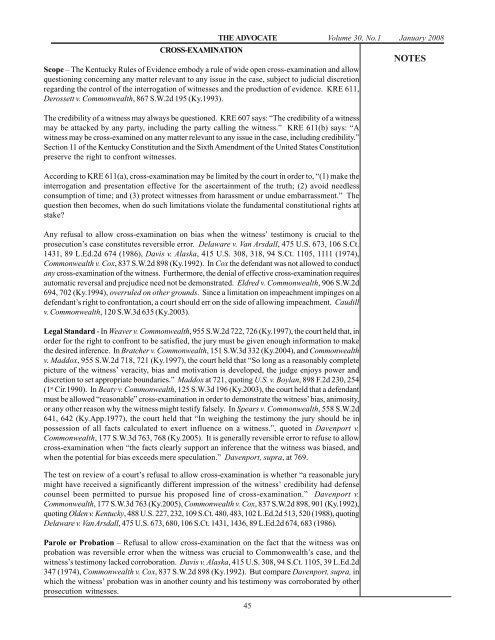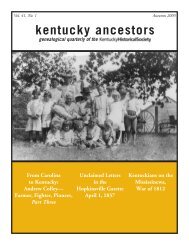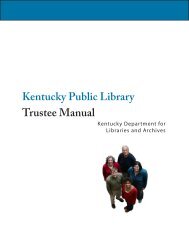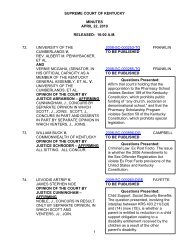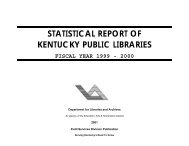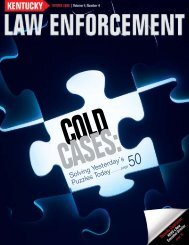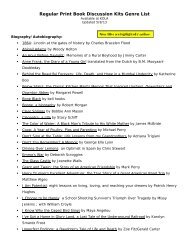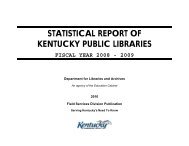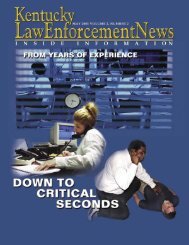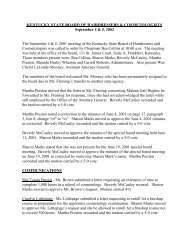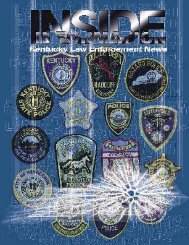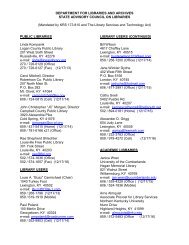Jan08 Advo.pmd - e-archives Home
Jan08 Advo.pmd - e-archives Home
Jan08 Advo.pmd - e-archives Home
Create successful ePaper yourself
Turn your PDF publications into a flip-book with our unique Google optimized e-Paper software.
CROSS-EXAMINATION<br />
THE ADVOCATE Volume 30, No.1 January 2008<br />
Scope – The Kentucky Rules of Evidence embody a rule of wide open cross-examination and allow<br />
questioning concerning any matter relevant to any issue in the case, subject to judicial discretion<br />
regarding the control of the interrogation of witnesses and the production of evidence. KRE 611,<br />
Derossett v. Commonwealth, 867 S.W.2d 195 (Ky.1993).<br />
The credibility of a witness may always be questioned. KRE 607 says: “The credibility of a witness<br />
may be attacked by any party, including the party calling the witness.” KRE 611(b) says: “A<br />
witness may be cross-examined on any matter relevant to any issue in the case, including credibility.”<br />
Section 11 of the Kentucky Constitution and the Sixth Amendment of the United States Constitution<br />
preserve the right to confront witnesses.<br />
According to KRE 611(a), cross-examination may be limited by the court in order to, “(1) make the<br />
interrogation and presentation effective for the ascertainment of the truth; (2) avoid needless<br />
consumption of time; and (3) protect witnesses from harassment or undue embarrassment.” The<br />
question then becomes, when do such limitations violate the fundamental constitutional rights at<br />
stake?<br />
Any refusal to allow cross-examination on bias when the witness’ testimony is crucial to the<br />
prosecution’s case constitutes reversible error. Delaware v. Van Arsdall, 475 U.S. 673, 106 S.Ct.<br />
1431, 89 L.Ed.2d 674 (1986), Davis v. Alaska, 415 U.S. 308, 318, 94 S.Ct. 1105, 1111 (1974),<br />
Commonwealth v. Cox, 837 S.W.2d 898 (Ky.1992). In Cox the defendant was not allowed to conduct<br />
any cross-examination of the witness. Furthermore, the denial of effective cross-examination requires<br />
automatic reversal and prejudice need not be demonstrated. Eldred v. Commonwealth, 906 S.W.2d<br />
694, 702 (Ky.1994), overruled on other grounds. Since a limitation on impeachment impinges on a<br />
defendant’s right to confrontation, a court should err on the side of allowing impeachment. Caudill<br />
v. Commonwealth, 120 S.W.3d 635 (Ky.2003).<br />
Legal Standard - In Weaver v. Commonwealth, 955 S.W.2d 722, 726 (Ky.1997), the court held that, in<br />
order for the right to confront to be satisfied, the jury must be given enough information to make<br />
the desired inference. In Bratcher v. Commonwealth, 151 S.W.3d 332 (Ky.2004), and Commonwealth<br />
v. Maddox, 955 S.W.2d 718, 721 (Ky.1997), the court held that “So long as a reasonably complete<br />
picture of the witness’ veracity, bias and motivation is developed, the judge enjoys power and<br />
discretion to set appropriate boundaries.” Maddox at 721, quoting U.S. v. Boylan, 898 F.2d 230, 254<br />
(1 st Cir.1990). In Beaty v. Commonwealth, 125 S.W.3d 196 (Ky.2003), the court held that a defendant<br />
must be allowed “reasonable” cross-examination in order to demonstrate the witness’ bias, animosity,<br />
or any other reason why the witness might testify falsely. In Spears v. Commonwealth, 558 S.W.2d<br />
641, 642 (Ky.App.1977), the court held that “In weighing the testimony the jury should be in<br />
possession of all facts calculated to exert influence on a witness.”, quoted in Davenport v.<br />
Commonwealth, 177 S.W.3d 763, 768 (Ky.2005). It is generally reversible error to refuse to allow<br />
cross-examination when “the facts clearly support an inference that the witness was biased, and<br />
when the potential for bias exceeds mere speculation.” Davenport, supra, at 769.<br />
The test on review of a court’s refusal to allow cross-examination is whether “a reasonable jury<br />
might have received a significantly different impression of the witness’ credibility had defense<br />
counsel been permitted to pursue his proposed line of cross-examination.” Davenport v.<br />
Commonwealth, 177 S.W.3d 763 (Ky.2005), Commonwealth v. Cox, 837 S.W.2d 898, 901 (Ky.1992),<br />
quoting Olden v. Kentucky, 488 U.S. 227, 232, 109 S.Ct. 480, 483, 102 L.Ed.2d 513, 520 (1988), quoting<br />
Delaware v. Van Arsdall, 475 U.S. 673, 680, 106 S.Ct. 1431, 1436, 89 L.Ed.2d 674, 683 (1986).<br />
Parole or Probation – Refusal to allow cross-examination on the fact that the witness was on<br />
probation was reversible error when the witness was crucial to Commonwealth’s case, and the<br />
witness’s testimony lacked corroboration. Davis v. Alaska, 415 U.S. 308, 94 S.Ct. 1105, 39 L.Ed.2d<br />
347 (1974), Commonwealth v. Cox, 837 S.W.2d 898 (Ky.1992). But compare Davenport, supra, in<br />
which the witness’ probation was in another county and his testimony was corroborated by other<br />
prosecution witnesses.<br />
45<br />
NOTES


